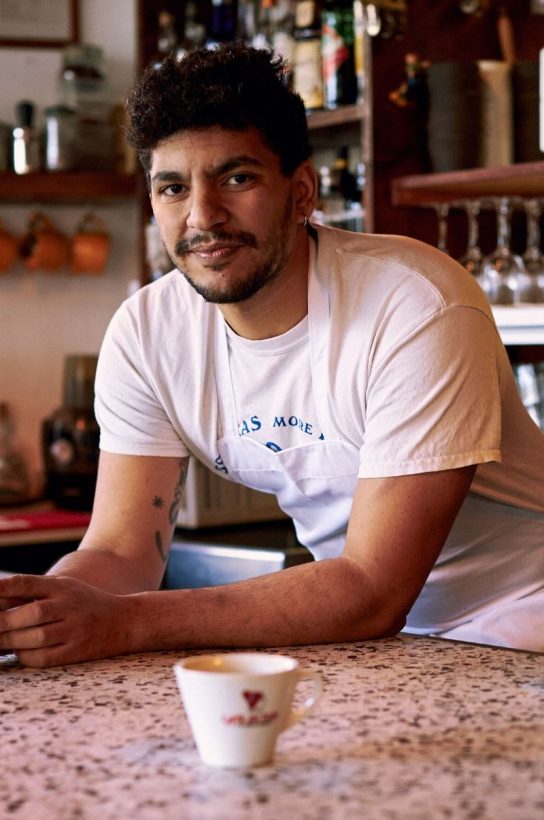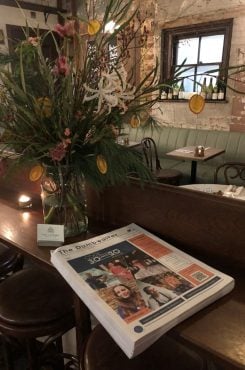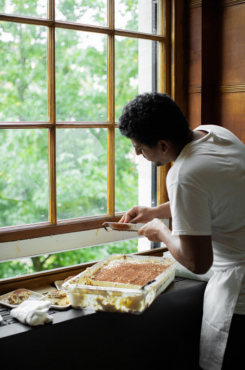Having worked at some of London’s most renowned restaurants, including The Clove Club and The Dairy Group, and witnessed his parents running a restaurant, Mitshel Ibrahim is a wealth of hospitality knowledge. Mitshel is now head chef at Italian restaurant Ombra, renowned for its fresh pasta and cured meats. Here he tells us about opening post pandemic, how the industry has adapted and the best thing about working in hospitality.
How has it been reopening Ombra post lockdown?
The response has been overwhelming so far. Weekends have been completely packed and weekdays are also very good. For the first time we are now taking reservations for the terrace and I guess that’s a strong selling point for us as some customers are still not comfortable sitting indoors.
Have you made any changes to your offering?
On weekends we are offering a set menu for £40, which stops a table of 4 from sharing one starter and some olives on a Saturday night. Now more than even space and the guests that take up that space is of premium importance due to the loss of covers from the 1m+ rule.
What was the most important lesson you learnt during lockdown?
Most chefs had to put their pride on the side – many of us never thought we would have to put our food in a plastic tub to make a living.
How do you think the industry has changed during this period?
There is much more support across restaurants/chefs/managers. Whatsapp groups during lockdown have been set up which have been extremely helpful in sharing information or personal tactics toward tackling various issues.
Where is the first place (other than Ombra) you’re going to eat?
I had my birthday at Hill & Szrok on Broadway Market. They’re butchers by day and a restaurant by night. Since restaurants have been able to trade again they offer a private hire of the venue at night that takes only 8-10 people to fill up. Another booking I’m really looking forward to is Ikoyi, which I’ll be visiting in a couple of weeks.
What is your favourite thing to cook at home?
Stir-fried rice. Usually after an aperitvo of campari soda.
Where is your favourite place for hospitality other than London?
I really like Vienna, Austria. I was cooking there last year. The landlords aren’t greedy like here in London, which means some restaurants are run by families, men and women who are able to afford to not have to open every single day, at every possible trading hour, just to be able to pay the rent. Meaning they have more time to spend with their family, loved ones, and have a life.
What is the best thing about working in hospitality?
The excitement of new produce coming into season. How dynamic it can be in a busy service working with an ever-changing menu – it leaves no time to get bored. I don’t think I could work at a desk or sit still for very long doing the same thing every day. Then of the course the community that hospitality brings. It’s different from other industries in which there are real friendships – most chefs & waiters are often share a glass of wine and a kebab after work.
What’s been the most rewarding part of your career so far?
Many peers and friends have congratulated me for the speed and the creativity with which we pivoted Ombra into a deli & pastificio as soon as lockdown hit. So I guess it’s been the support that the industry has shown. With Ombra being an Italian restaurant, heavily focused on pasta that we make fresh on site, it felt very natural to switch into a kind of pasta production lab, selling, of course, pasta, as well as a couple of simple sauces for people to assemble, some cold cuts and cheeses.
What advice do you have for those starting out in the hospitality industry?
You’ve got to love what you do and you’ve got to have stamina. The hospitality industry is an honest industry in the sense that your talent is literally the proof in the pudding. You won’t last otherwise! You have to be able to maintain a certain level of energy physically and intellectually in order to keep wanting to improve your skills and knowledge too.
For more Q&As and industry insights, subscribe to the CODE Quarterly magazine here



